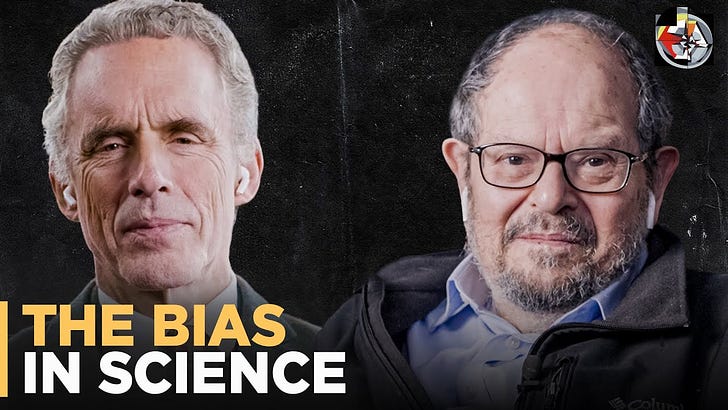Why There Will Never Be a Climate Consensus
The combination lock model. And why the powers-that-be don’t want us thinking too hard about complex issues.
It’s a gorgeous day so you decide to grab your bike and hit the trail. You’re out there for hours, but eventually you get hungry. You exit the trail and ride up to the nearest restaurant but suddenly curse, realizing you forgot to bring your bike lock.
“That’s all right,” says a stranger. “You can use my combination lock.”
“Very kind of you,” you say, but when you examine the lock, you see a problem: there is no combination. There’s only a single tumbler on the lock, and it only has two digits: 1 and 2.
“Umm, this won’t work,” you say.
“Why ever not?” says the stranger, nervously.
“There’s only two possibilities,” you point out. “The thief only has to try one number, and if he gets it wrong, tries the other, and I have no bike. What are you trying to pull, anyway?”
The stranger grabs his “lock” and runs away.
And so the deceivers would have us believe that a topic as massive as “climate” comes down to a simplistic choice.
You’re either position 1 or position 2, a “believer” or a “denier”. That’s it.
Any time I hear the word “consensus” in the same breath as “climate” my brain reels with the nested systems of complexity being paved over to make it true.
I understand humans have to simplify things in order to understand them, but when it’s something as vast and complex as “climate”, the sheer number of lumped in, smuggled assumptions make it nothing short of insidious. Clearly, the purveyors of “consensus” don’t want us thinking too hard about it.
Because the minute you do start thinking about it, the “consensus” vanishes.
If, for example, we add in just three issues related to climate on which you and I might take a slightly different position, it’s like adding three tumblers to the lock. And, assuming only two possibilities for each position, we now have 2 x 2 x 2 x 2 = 16 distinct combinations, instead of 2.
If we allow for degrees of difference for each position, we might have something like 3 x 3 x 3 x 3 = 81 distinct combinations, or 4 x 4 x 4 x 4 = 256 distinct combinations.
Much more complex.
Now think about what you know about climate. Without trying too hard, how many tumblers do you think we could add to the lock?
Such as…
What is the timescale of the change? Are we talking about change over minutes, decades, millennia? Change from what, to what? What is the baseline? What is the ideal? Do two people even mean the same thing by “change” or must we specify?
What is the cause of the change? Are humans the sole cause of change, i.e., the planet would be utterly static and unchanging without us around? Or is it all natural change with no human input? Or is it a combination of the two? And if so how much of the contribution is human? Is it even reducible to one or two causes, or are the causes complex and multivariate?
Is the change catastrophic? Is it mild? Is it beneficial? Is the change problematic for some but beneficial for others? Is the change manageable or will we be overwhelmed by it?
Is all environmental change related to population? To temperature? To carbon usage? What about food and water and air toxicity? What about resource management? What about food production and manufacturing methods and waste disposal? What about energy production? What about deforestation? Are these more pressing environmental concerns than parts per million trace gases and global temperatures?
Have we actually gotten better at some of these things, like fire management and building methods, not catastrophically worse, as the media and pundits would have us believe? Or have we gotten worse and more idiotic and it’s a slow, inevitable slide into an environmental hellscape?
Do we actually have a full and perfect understanding of atmospheric physics, meteorology, environmental chemistry, geoscience, plate tectonics, astronomy, oceanography, etc. or is there still work to be done in these fields? What are the research biases and complexities involved? Are there financial incentives which skew climate-related studies one way or another? Does the system of research grants reward anyone who questions the mainstream scientific narrative? Is anything being suppressed or censored? Can we be sure we’re in possession of a true, unbiased picture of what’s really happening on a planetary scale, and that all of the actors and institutions involved are honest, have no conflicting motives, and have nothing to hide?
And what about political motivations? Are some politicians and corporations and celebrities simply virtue-signaling, greenwashing, etc., while continuing right on contributing to the problem? Or creating a problem where there is none? And are they financially motivated at all? Or are they earnest warriors in the cause of saving the planet? Or are they earnest but have nothing to substantive to offer in the way of practical solutions? Or will their “solutions” be the utter destruction of us?
Assuming we do have some real environmental challenges, what are the solutions? Will some of them solve themselves? Can we solve them using innovation or technology or alternative resources? What about lifestyle changes? By electing the right people, or voting out the wrong people? By using force and carbon taxes and lockdowns? By using worldwide dictatorship with supposedly wise and beneficent leaders to shepherd us like cattle? By destroying supply chains and economies until everyone is starving and impoverished? With a slow-kill bioweapon to reduce the planetary population?
Even if we tried all these things, would they make any actual environmental difference, or simply be a pointless act of self-extermination?
Each tumbler adds complexity, and is a point on which we might not agree.
Now, I’ve brought up about fifty points here, but let’s keep it manageable. Let’s say we’ve only introduced fifteen new tumblers to the lock, each of which has a possible position of “yes”, “no”, or “maybe. That’s 3 x 3 x 3 x 3 x 3 x 3 x 3 x 3 x 3 x 3 x 3 x 3 x 3 x 3 x 3 = 14,348,907 possible positions on our combination lock.
So, assuming we only allow for fifteen climate-related issues, that’s over fourteen million ways that your position might differ from mine. (Though, obviously, some will mutually exclude one another.)
And, of course, most of the time, the issues involved are many times more complex than simply yes, no, and maybe.
The idea of a singular “consensus” on the entire topic of “climate” is ludicrous.
You and I might agree, for example, that we love nature and want to preserve it, that the climate is changing, and we might even agree that humans contribute to it, but we disagree that it is catastrophic, and we disagree that voting the right person into office is any kind of solution (except as it mitigates or adds to the problem of “hot air” 😆), and we disagree that the solution is a technologically-enforced carbon passport social credit system run by the AI overlords.
So our first two sets of tumblers might look like:
Hooray! “Consensus”!
But once we add in the other tumblers:
There were 243 possibilities, and we ended up somewhere very different.
And we didn’t have to dig deep to find this complexity. The complexity showed up right away, as soon as we start making any distinctions or observations, at all.
It cannot remain simplistic for even the one second that it takes to call any climate-related issues to mind, and to see that you and I differ in the slightest degree.
The complexity is immediate, readily observable, and overwhelming.
Complexity is hard. It requires talking, communicating, disagreeing, trying things, learning from mistakes, communicating some more…
Of course, the powers-that-be don’t want us involved in any of this. They don’t want us thinking it’s a complex matter, because then there might be a million opinions and a million solutions on a million different fronts.
They want us to believe there is only one problem: free humans, and one solution: enslave all the humans.
Climate Change therefore Global Dictatorship.
This is the lopsided syllogism we’re supposed to accept without thinking.
As with the fictional thief with the two-digit bike lock, when presented with this simplistic choice of positions, we should be asking: “Hey, WTF are you trying to pull?”






So true and always about money, this wonderful plant is millions of years old and has taken care of itself during all that time. Yes we need to be more careful, mainly with the ocean, but this race to be the leader and at the forefront is just over the top and needs to stop.
The Earth has been here for ~a bazillion years.
Geological record shows that the climate has always been unstable.
Cold>warm; dry>rainy; O2/CO2 up, down, catty wumpus.
Polar ice melt, freezes, goes bye-bye, comes back and freezes to the equator.
Lather, rinse, repeat.
Weather on this planet does what it pleases.
CO2 has gone as high as >500ppm.
CO2, methane, and other "greenhouse gases" poot from the Earth's core. Volcanos. Cracks and fissures in the crust.
Planet is still here.
Sun rises and sets.
Worried about CO2 levels?
Quit covering the countryside with non-recyclable PVs and wind farms. Put them on roofs close to where they will be used.
Restore wetlands, grasslands, and forests.
Put scrubbers on yer coal plants.
Do something intelligent.
This planet runs on carbon.
It is carbon.
The Carbon Phobia is a quack religion.
A cult.
I rejected this nonsense long ago.